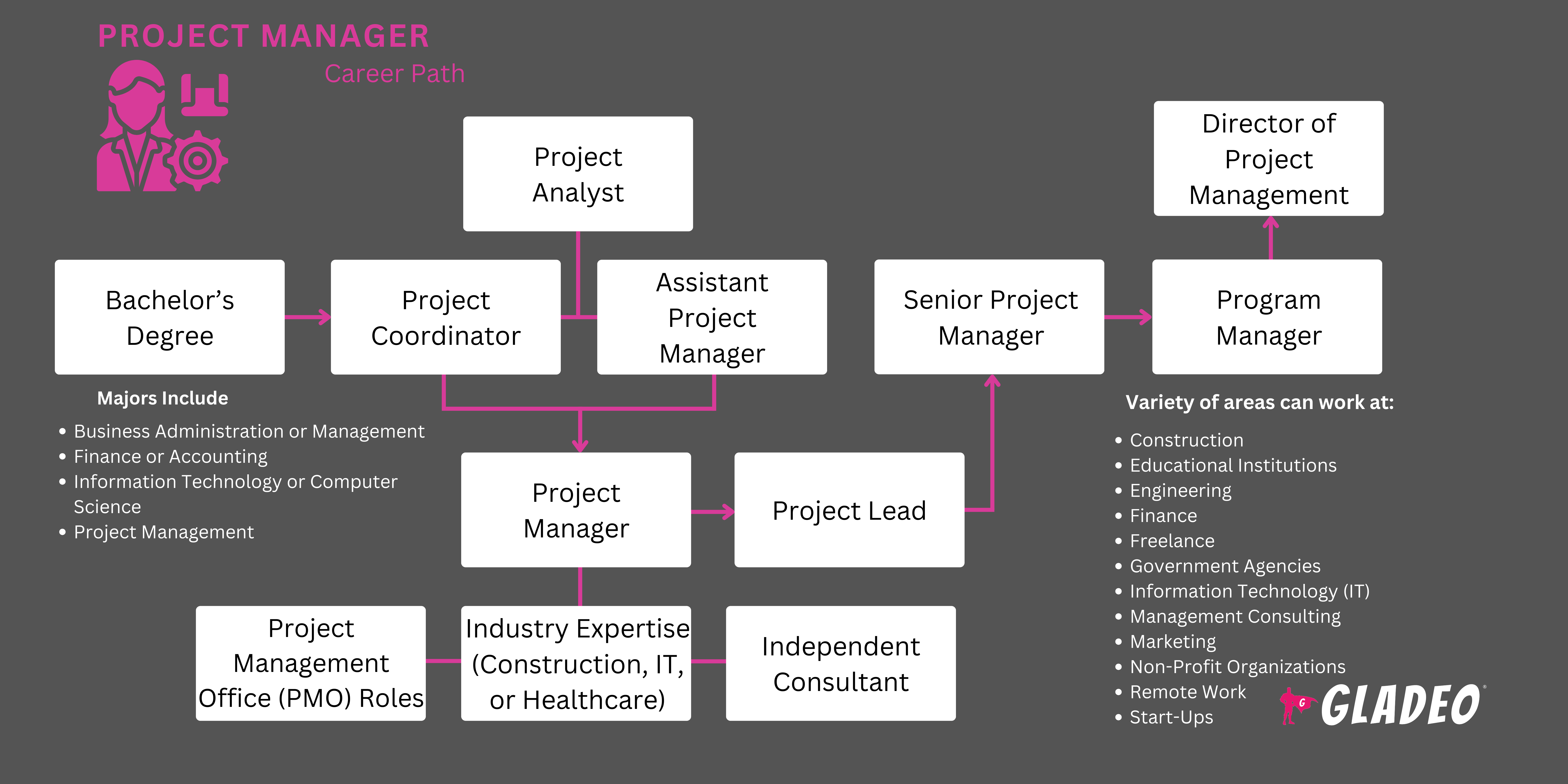Spotlights
Project Coordinator, Program Manager, Project Lead, Project Administrator, Project Officer, Project Consultant, Project Planner, Project Analyst, Project Supervisor, Project Team Lead
Sometimes tasks are too big to be done by one person. Some projects are so large, they take several experts working together towards a common goal. But with everyone focused on their parts, who’s in charge? Usually, it’s a Project Manager, assigned to oversee processes and ensure a smooth workflow.
Project Managers, sometimes simply called PMs, don’t work in any particular field; they can work in virtually any field! Their broad range of duties includes overseeing the planning, execution, and completion of projects, meeting deadlines, keeping budgets, and fulfilling objectives. They also manage teams, monitor work progress, coordinate resources, resolve issues, and correspond with stakeholders about updates and changes.
Project management requires constant multitasking, problem-solving, and decision-making to keep everyone working effectively toward project success!
- Leading projects from conception to completion
- Collaborating with diverse individuals and teams
- Finding creative solutions to problems
- Seeing the results of your contributions
Working Schedule
- Project Managers work full-time, with overtime possible. They might work in offices, from home, or at job sites, depending on employer requirements.
Typical Duties
- Meet with stakeholders and department heads to review the scope of a proposed project
- Draft project plans listing tasks and subtasks, employees and contractors to assign tasks to, timeframes and milestones, necessary resources, and proposed budgets
- Establish and manage project teams. Clarify roles and responsibilities
- Negotiate with and hire contractors. Work with vendors and suppliers
- Create, share, and explain workflow guidelines
- Use project management software to monitor progress and communicate with teams
- Oversee budgets and consider the most effective use of funds
- Anticipate potential problems and try to mitigate them
- Suggest areas for improvement along the way. Keep workers motivated and focused
- Meet with team leads to discuss performance or quality issues. Solicit feedback and resolve problems
- Address project delays and cost overruns
- Keep stakeholders updated. Listen to and take action on feedback provided
- Comply with safety protocols, legal requirements, and quality standards
- Evaluate project milestones along the way. Identify and incorporate lessons learned
Additional Responsibilities
- Schedule team meetings
- Assess completed projects to ensure employer requirements have been met
- Manage project-related documentation. Protect sensitive information
- Promote a positive workplace culture
- Keep up with best practices related to project management and the industry that the project is in
Soft Skills
- Adaptability
- Analytical
- Communication
- Conflict resolution
- Critical thinking
- Leadership
- Motivated
- Organizational skills
- Problem-solving
- Teamwork
- Time management
Technical Skills
- Accounting, budgeting, and financial management programs
- Cloud-based data-sharing programs (Google Drive, Slack)
- Content workflow software
- Contract negotiation and vendor management
- Document management
- Human resources management
- Process mapping
- Project management software (Monday, Asana)
- Risk assessment and management
- Scheduling and timeline management
- Spreadsheets
- Teleconferencing
- Construction companies
- Software development firms
- Manufacturing companies
- Marketing and advertising agencies
- Healthcare organizations
- Government agencies
The Project Management Institute explains that project management is “the use of applicable knowledge, skills, tools, and methods to deliver value.” So Project Managers must have that knowledge and those skills to deliver projects on time and within budget while meeting high-quality standards.
Their role requires strong leadership, flexibility, and the ability to juggle multiple tasks under tight deadlines. Long hours may be required to address challenges, especially during critical project phases.
Despite the job demands, PMs love the feeling of successfully completing projects. Their efforts make a positive impact on organizations and, by extension, employees! They’re also one of the major keys to employee satisfaction, keeping teams motivated and on target.
Project management continues to be transformed by technologies like automation and artificial intelligence. These innovations have revolutionized project tracking and risk management, providing more accurate data, predictive analytics, and real-time updates. This allows PMs to make better decisions, anticipate potential issues, and streamline processes.
Agile frameworks are helping with collaboration and iterative progress, empowering teams to respond quickly to changes, incorporate feedback continuously, and deliver value to stakeholders. This dynamic, adaptive project approach is reshaping how projects are executed and managed.
Another trend is socially responsible project management! Organizations are more aware of their ethical responsibilities and environmental/social impacts these days. Thus, PMs must incorporate sustainability goals to minimize negative impacts while ensuring projects contribute to society.
- Project Managers can work in almost any industry, so employers might prefer to hire someone with a degree related to their industry. Others may prefer a candidate with a bachelor's degree in business, management, project management, or a related field
- Common classes may include:
- Agile Project Management
- Leadership and Team Dynamics
- Project Cost Management
- Project Management Tools and Techniques
- Project Planning and Scheduling
- Project Procurement Management
- Quality Management
- Risk Management
- An applicant with a relevant industry degree and work experience plus a project management certification (such as the Project
Management Institutes’ Project Management Professional or the Scrum Alliance’s Certified ScrumMaster) could be an ideal choice! - Other certifications include:
- American Academy of Project Management - Project Manager Ebusiness
- International Business Training Association - Certified Business Professional - Project Management
- SAP America - Portfolio and Project Management
- Because PMs must lead and manage teams, having human resources or human capital management experience can also be beneficial
- Many organizations offer PM-related apprenticeship programs which can provide valuable training and practical experience
- To qualify for more advanced positions, you may need a master’s degree
- Look for accredited colleges offering majors either related to the industry you want to work in, or in business, management, project management, or a related field.
- Note, that STEM programs should be accredited by ABET.
- Seek programs with internships or opportunities to get practical experience.
- Compare tuition and fees costs, noting in-state vs. out-of-state costs.
- Review scholarship and financial aid options.
- Check out graduation and job placement statistics.
- In high school, you’ll need to master a lot of subjects, including business, management, and mathematics
- To hone your people and communication skills, take English, writing, speech, and debate
- If you plan to work in a technical field, sign up for plenty of math, science, engineering, and technology courses in high school
- Apply for part-time jobs where you have to manage complex projects
- Volunteer for school extracurricular activities, with a focus on roles that offer leadership and management experiences
- Take online courses via edX or Udemy to polish up your PM skills
- Read articles and watch videos related to agile project management practices and techniques
- Keep track of all your work and academic accomplishments for your resume and/or college applications
- Build a portfolio of projects and achievements related to project management

- To work as a Project Manager, you may have to start in an entry-level job and get experience first
- Make a profile on LinkedIn and other networking platforms to advertise your availability
- Scan job portals like Indeed.com, Glassdoor, ZipRecruiter, USAJOBS, and other sites
- Review job ads and look for keywords to list on your resume, such as:
- Agile Methodologies
- Budget Management
- Milestone Tracking
- Performance Metrics
- Process Improvement
- Project Planning
- Quality Assurance
- Resource Allocation
- Risk Management
- Schedule Management
- Team Leadership
- Vendor Management
- Workflow Optimization
- Review Project Manager resume templates
- Read sample interview questions and practice your replies via mock interviews. Sample questions might include:
- “How do you handle a situation where a project is falling behind schedule, and what steps do you take to bring it back on track?”
- “Can you give an example of when you had a difficult stakeholder? How did you ensure their needs were met while keeping the project objectives in focus?”
- Stay connected to your professional network. Ask for leads on upcoming job openings
- Ask former professors and supervisors to write recommendation letters or request their consent to list them as references
- Keep up with developments related to project management and the industry you work in
- Dress appropriately for job interviews!
- The best way to move up is to meet deadlines, stay within (or under budget), and exceed expectations!
- Let your supervisor know you are interested in advancement. Offer to take the lead on tough projects and ask if there’s any additional education and training they recommend for you to improve your value to the organization
- For example, you can get a Project Management Professional certification or become a Certified ScrumMaster
- If you have a bachelor’s, consider knocking out a master’s degree
- Treat teams with respect, keep them motivated, and hold them accountable
- Anticipate problems and be proactive in preventing them. When a problem is unavoidable, offer feasible solutions and stay focused on end goals
- Grow your professional network by staying active in organizations like the International Project Management Association or Project Management Institute
- Stay current on regulatory changes to ensure your organization is always compliant
- Seek feedback from stakeholders and team members to identify areas for improvement
Websites
- AACE International
- American Management Association
- American Society for Engineering Management
- Association of Business Process Management Professionals
- CompTIA
- Financial Management Association International
- Institute of Certified Professional Managers
- Institute of Management Consultants USA
- International Association of Emergency Managers
- International Project Management Association
- National Contract Management Association
- National Management Association
- Project Management Institute
- ProjectManager.com
- Scrum Alliance
- Society for Human Resource Management
- Society for Information Management
Books
- A Guide to the Project Management Body of Knowledge, by PMI
- Scrum: The Art of Doing Twice the Work in Half the Time, by Jeff Sutherland
- Visual Project Management: Simplifying Project Execution to Deliver On Time and On Budget, by Mark J. Woeppel
Project management can be fun and rewarding – but it’s also sometimes confusing and stressful! Unlike most professions, a Project Manager can take their skills and apply them to virtually any industry, which is handy. But if PM work isn’t for you, check out some related career paths below!
- Administrative Services Manager
- Business Analyst
- Computer and Information Systems Manager
- Construction Manager
- Consultant
- Cost Estimator
- General and Operations Manager
- Information Technology Project Manager
- Logistician
- Logistics Analyst
- Management Analyst
- Market Research Analyst
- Operations Manager
- Product Manager
- Program Manager
- Survey Researcher
- Training and Development Manager
Newsfeed

Featured Jobs

Online Courses and Tools







